
Drop The Dead Donkey: Making and breaking the headlines
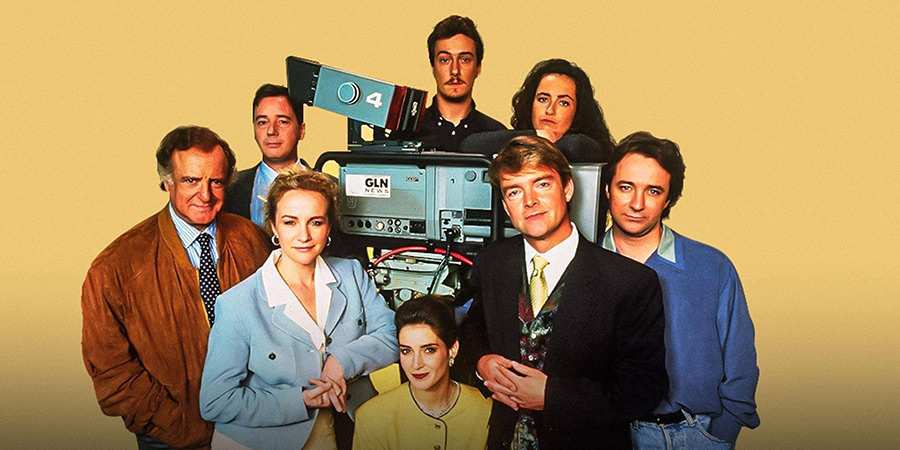
For anyone who is concerned, it is worth saying from the outset that no donkeys were harmed during the making of this sitcom. Although you'd be forgiven for thinking it from the title alone, Drop The Dead Donkey had nothing at all to do with the demise of hoofed mammals but was instead all about the world of television news.
Despite rumours that the title was based on a well-known journalistic phrase, the writers (Andy Hamilton and Guy Jenkin) simply made it up as something stupid that they imagined might be shouted out in the tense a few minutes before a live news broadcast. The series could just as easily have been called Dead Belgians Don't Count or Dead Kuwaitis Don't Count as these titles were also considered at one point. All they knew was that they wanted something which sounded cynical; this would become a hallmark of the series which satirised the increasing real-life move towards news output based on sensationalism, celebrity culture and a lack of journalistic independence.
Airing on Channel 4 from 1990 to 1998, Drop The Dead Donkey is one of the channel's longest running sitcoms with 65 episodes. The series is set in the offices of GlobeLink News, a fictional TV news company, which is taken over by media mogul Sir Royston Merchant in the first episode. An allusion to Rupert Murdoch and/or Robert Maxwell (the shared initials just being one of the similarities), Sir Royston's aim is to turn the company from an objective and serious news outlet into a sensationalist tabloid television channel in order to boost ratings and, therefore, his profits.
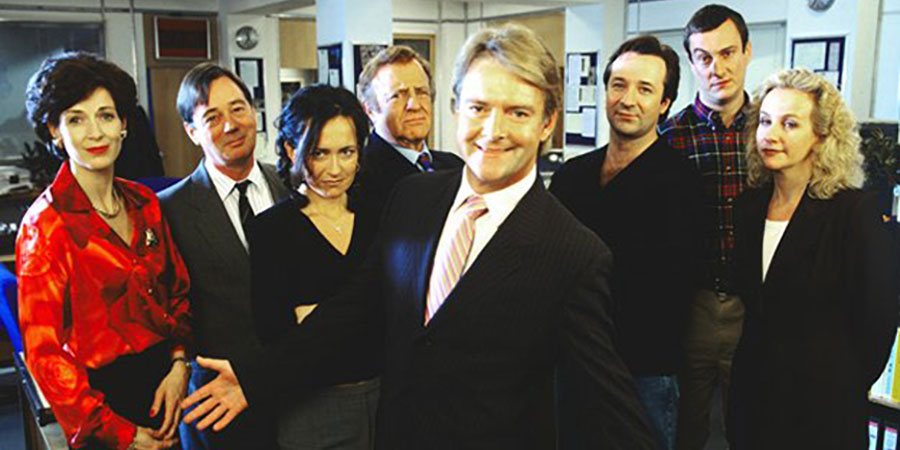
Although Sir Royston and his motives are critical to the plot of the series, he only makes a brief appearance in the final episode and so it is Gus Hedges (Robert Duncan), a yuppie yes-man chief executive appointed by Sir Royston, who carries out his orders in the office. Gus frequently uses management jargon - preferring the term 'change of management emphasis' to 'takeover' - and, whilst he claims to have a hands-off approach when it comes to editorial decisions, he is always quick to remind the rest of the staff team that Sir Royston's interests should be taken into account, especially if they want to keep their jobs.
It is the editor, George Dent (Jeff Rawle), who often has to deal with the consequences of this interference. George is well-meaning but naive and is usually too afraid to challenge Gus. He is seen by his colleagues as a pushover, and they often take advantage of his good nature. For example, George regularly finds himself unable to sack reporter Damien Day (Stephen Tompkinson) even though his filming methods are wholly unethical and often result in the injury of his cameraman Jerry (voiced by Andy Hamilton). But because Damien's stories are sensationalist and seemingly popular with viewers, George is frequently overruled by Gus on this and many other matters.
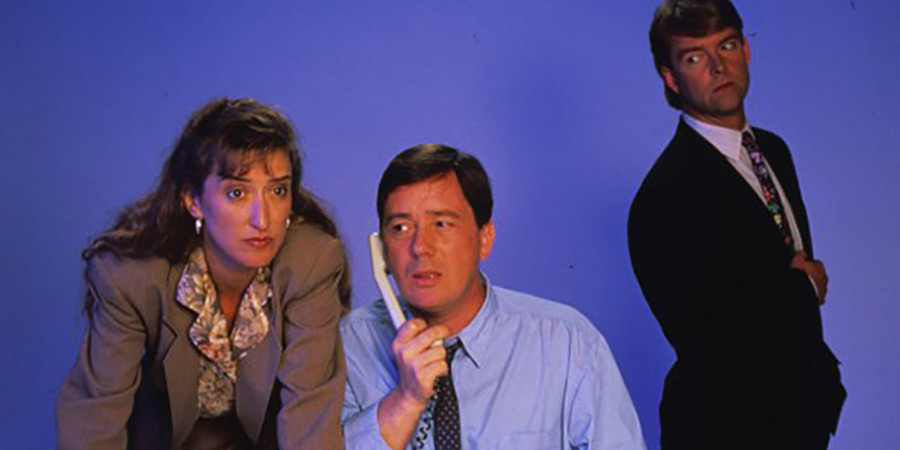
In Series 1 and Series 2, George's capable second-in-command, assistant editor Alex Pates (Haydn Gwynne), attempts to support George and bring some order to the office. At the start of Series 3 she is replaced by Helen Cooper (Ingrid Lacey). Helen is extremely efficient and finds herself frustrated by the inefficiency around her, such as news anchors Henry Davenport (David Swift) and Sally Smedley (Victoria Wicks) taking long lunches to carry out personal errands or make promotional appearances for extra money.
Henry is an outspoken veteran reporter and presenter who has little time for the type of news industry which Sir Royston wants to create. When not working, he spends much of his spare time drinking, gambling and womanising. Sally joins GlobeLink in the first episode, getting the job essentially just because she is pretty. Although she thinks highly of herself, she actually has little knowledge of (or interest in) current affairs which means she is disliked by the rest of the team. Henry gets on well with his younger colleague Dave Charnley (Neil Pearson), mostly owing to their similar hedonistic interests.
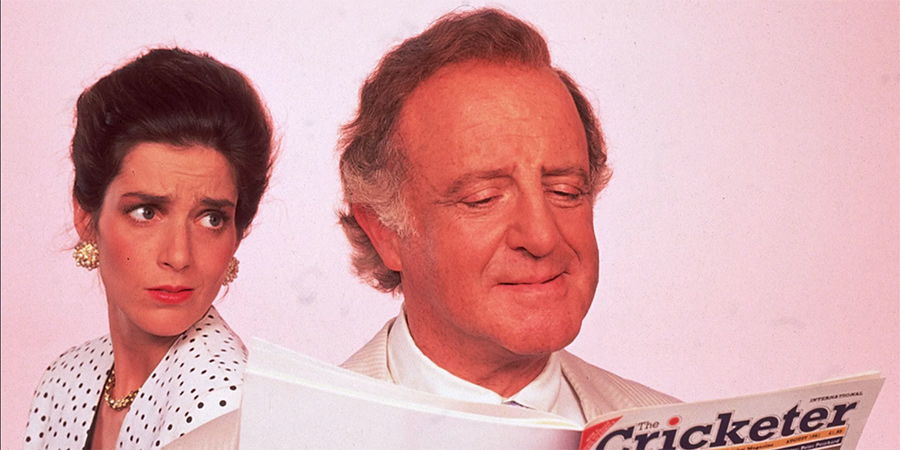
Completing the team at GlobeLink News is the ironically named Joy Merryweather (Susannah Doyle) who joined in Series 2 as an apathetic and aggressive office assistant who will avenge anyone who crosses her path.
Much of the comedy derives from the interactions between these characters, and they operate like a dysfunctional family. As with many other great British sitcoms, a feeling of frustration and resentment is prominent throughout. It appears that the characters are doing jobs they aren't interested in or suited to, with people they don't like, with little expectation that this will change. As Helen points out on one occasion, they are a team of "sad, stunted, inadequate[s] who hang around at work because [they] have no meaningful personal lives."
It is hard to ignore that none of the characters have happy or stable lives outside of work. George eventually divorces his thankless wife, Margret, and often receives phone calls to the office about his wayward teenage daughter Deborah; Sally seeks solace in casual sexual liaisons because she has emotional issues with commitment; Dave is likely to follow in Henry's footsteps as a serial womaniser and borderline alcoholic with a gambling addiction; Gus is incredibly lonely as he chooses to sacrifice all relationships in order to ingratiate himself with Sir Royston and further his career.
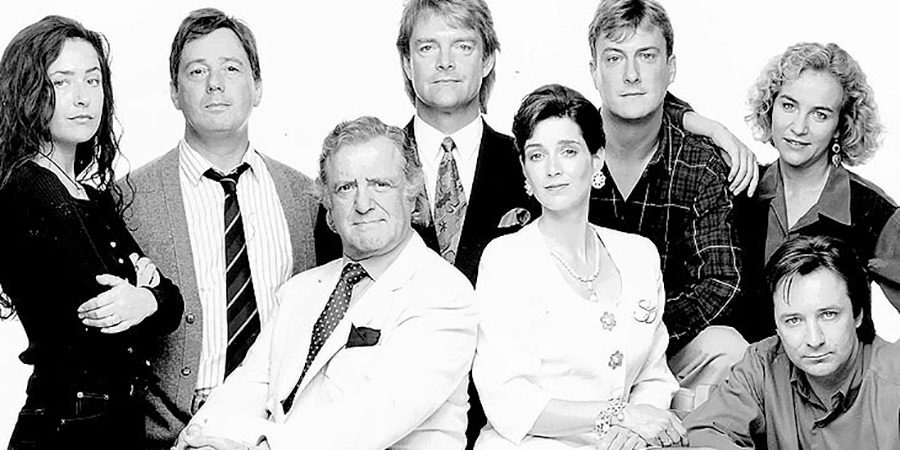
As a satirical comedy, Drop The Dead Donkey uses techniques such as exaggeration, irony and humour to provide a political and social commentary of Britain in the 1990s. Although its exact origins can be debated, the satire boom is often said to have begun in Britain in the early 1960s with shows like Beyond The Fringe and That Was The Week That Was paving the way for a style of comedy which was not afraid to ridicule authority figures and societal trends. In the 1970s and 1980s, Hamilton and Jenkin were able to gain experience in this genre when they picked up writing credits for sketch shows like Not The Nine O'Clock News and Spitting Image. Sitcoms such as Yes Minister and The New Statesman sought to satirise the state of the political system. There was also Hot Metal, a LWT series which is a parody of journalism and the newspaper industry which was, in some ways, a forerunner of Drop The Dead Donkey.
So whilst Drop The Dead Donkey was by no means the first sitcom to explore these issues, what made it unique was that the scripts were written with gaps which would then get updated with ever more topical references right up until the time of recording. This was where the BBC, who had originally commissioned a script, missed the point. They failed to read it on the day it was submitted, as instructed. When they did get around to looking at it months later, the jokes were no longer relevant or funny and so they passed on the commission... which is why the series eventually ended up on Channel 4.
With episodes only filmed the day before transmission, the cast had very little time to respond to these last-minute script changes. They got round this by writing lines on newspapers or clipboards which they would be holding as part of the scene. This fast-paced way of writing and filming seemed natural and even created a layer of authenticity, since it would not be unusual for people working in a news studio to be reading off clipboards and reacting to last minute changes.
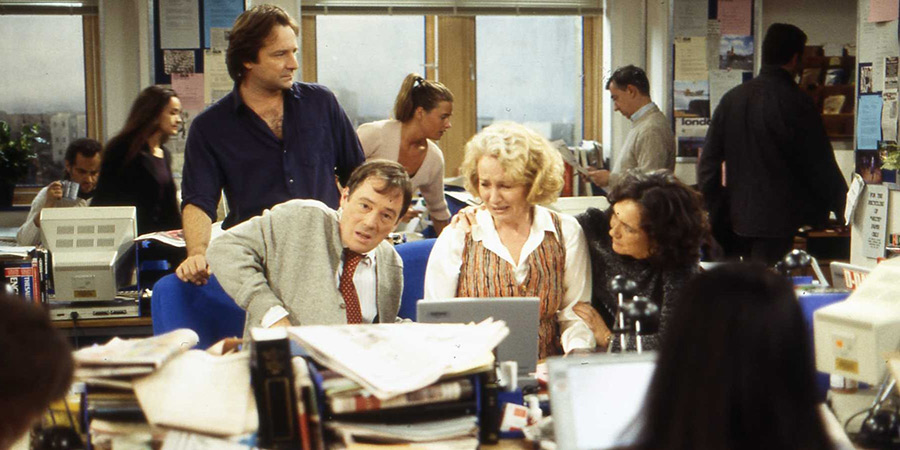
No person or event in the news at the time was out-of-bounds for ridicule. References ranged from John Major to Paul Gascoigne, from the Gulf War to the cancellation of the BBC soap opera Eldorado.
With guest appearances from the likes of Ken Livingstone, Neil Kinnock, Sir Teddy Taylor, Michael Buerk, Sue Carpenter and Dale Winton, the series was so grounded in the culture of the 1990s that repeats include a news debrief on what was happening at the time of the original transmission to help audiences understand some of the references.
The obvious danger of creating a series so clearly rooted in one specific period of time is that the references become ephemeral and therefore not understandable or relatable after the original broadcast. But Drop The Dead Donkey avoids this danger because, ultimately, it is a workplace sitcom, driven by an ensemble cast of characters whose traits would be recognisable in many offices and workplaces across the country. The well-meaning but weak manager; the indifferent office junior; the arrogant snob; the overly controlling manager; the annoyingly efficient one; the office lothario; older team members who are resistant to change; younger team members going to extreme lengths to prove themselves; the person who organises events and sweepstakes to boost morale...
Like many other great sitcom writers before them, Hamilton and Jenkin created characters with notable flaws who aren't naturally likeable and yet, as the series progresses, their vulnerabilities are explored and the audience can begin to understand why they behave a certain way. For example, when Damien's mother makes an appearance, it becomes clear that she had unrealistically high expectations of her son when he was growing up and constantly pressured him to achieve. Her lack of praise and affection towards him would explain his sociopathic tendencies. We also learn that Sally was raised by her grandmother but experienced abuse at her hands by, amongst other things, being locked in a basement full of rats. Sally's vulnerability is also shown when, in one episode, she has a miscarriage just before she is about to give an important magazine interview.
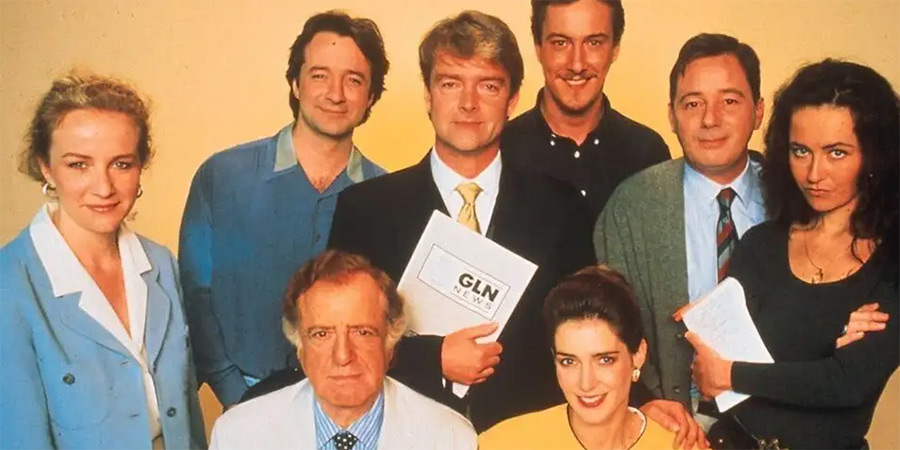
The attention to detail given to the characters and their relationships with each other explains why, by the time of the sixth (and final) series, the focus was less on topical news stories and more on what would happen to GlobeLink News and the team after Sir Royston announces that he plans to close the company.
The last episode is strangely moving as a final montage shows how the characters are adjusting to their new lives. For some, the outlook appears to be positive.
Henry finds an outlet for his controversial views on a late-night radio show where he hires Dave as his assistant and is brought sandwiches by Helen who is now a delivery driver. Sally looks set to come into some money after she marries an old rich man with a weak heart. But for the others, things are much more bleak.
In a final attempt to prove himself as the ultimate sensationalist reporter, Damien travels to a remote jungle to film a group of natives. They end up making him a god which, at first, Damien seems to enjoy but then he realises he is going to be trapped there, as the natives refuse to let him leave.
Joy is excited about a chance to develop a new career in art but she sadly discovers she is being conned, although she gets some satisfaction in being able to deal with the scammer in her own ruthless way.
George forgoes his chance at happiness of a new life in Australia in order to care for his sick ex-wife who would never do the same for him if the situation was reversed.
The final scene is especially tragic as Gus sits motionless in a fire-damaged office (presumably Sir Royston had the building burnt down on purpose to claim on the insurance) whilst removal men clear out the furniture from around him. Gus is devastated to learn that, having given his life to doing Sir Royston's bidding, his boss barely knew his name and was willing to dispense of him without a second thought.
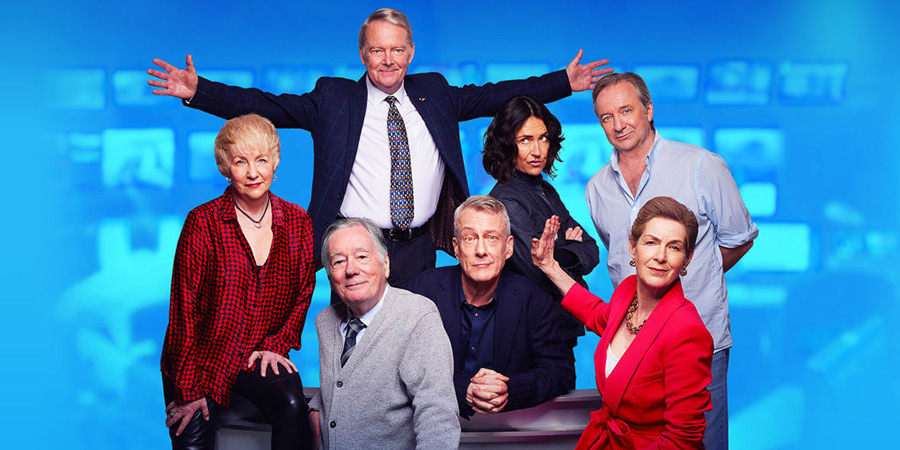
The fact that Drop The Dead Donkey is being revived as a stage show with the original cast is testament to how popular the show remains over 25 years after it ended.
Part of this success can be explained by its ability not merely to make the audience laugh, but also to be thought provoking. One of the purposes of satire is to facilitate discussions about the kind of society in which we want to live and challenge us to play our part in potentially creating something better. Whilst so much has changed since the series first aired, it is also surprising how much has remained the same. Issues referenced in the show - wars in Middle-East; Britain's relationship with Europe; strained relationships in the Royal Family; threat of nuclear war; conflict in the Conservative Party; the rise of celebrity culture - remain all too familiar.
Also, the fundamental question at the heart of the series still remains: can journalistic integrity prevail in a world where only a wealthy few have the power to set the agenda? This notion is perhaps something we should allow to percolate in our mental mainframes during the forthcoming period.
Where to start?
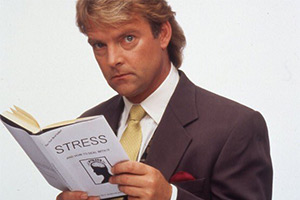
Series 4, Episode 7 - Crime Time
When the director of Damien's new crime programme leaves the show, Gus takes over and begins to make it far more sensationalist.
Drop The Dead Donkey is available on DVD and available to stream via BritBox and Channel 4
Help us publish more great content by becoming a BCG Supporter. You'll be backing our mission to champion, celebrate and promote British comedy in all its forms: past, present and future.
We understand times are tough, but if you believe in the power of laughter we'd be honoured to have you join us. Advertising doesn't cover our costs, so every single donation matters and is put to good use. Thank you.
Love comedy? Find out moreDrop The Dead Donkey - The Complete Box Set

For the first time ever, all six series of the brilliant, topical TV comedy series Drop The Dead Donkey are featured in this 11 disc DVD box set.
Familiarise yourself with Globelink News, primed to bring you the latest headlines...somehow. Under the ineffective management of Gus, the team bicker, tease, gamble and mock their way through the day's news. Henry and Sally hate each other. Damien would sell his grandmother for a story. Dave would sell his grandmother for a bet. George does his best to lead the team and Alex his deputy does her best to limit the damage.
Winner of 4 British Comedy Awards and a BAFTA, Drop The Dead Donkey established itself as one of the most popular satirical comedy series ever, with a great ensemble cast, colourful enduring characters and a script that hilariously lampooned 1990s media, management and politics.
Cameo performances come from from MPs Teddy Taylor and Ken Livingstone.
As entertaining and funny today as the news-filled week it was broadcast.
Includes the finale and Emmy Award-winning episode Xmas Party
First released: Monday 30th November 2015
- Distributor: Spirit Entertainment
- Region: 2
- Discs: 11
- Catalogue: SEL2054
![]() Buy and sell old and new items
Buy and sell old and new items
Search for this product on eBay
BCG may earn commission on sales generated through the links above.

